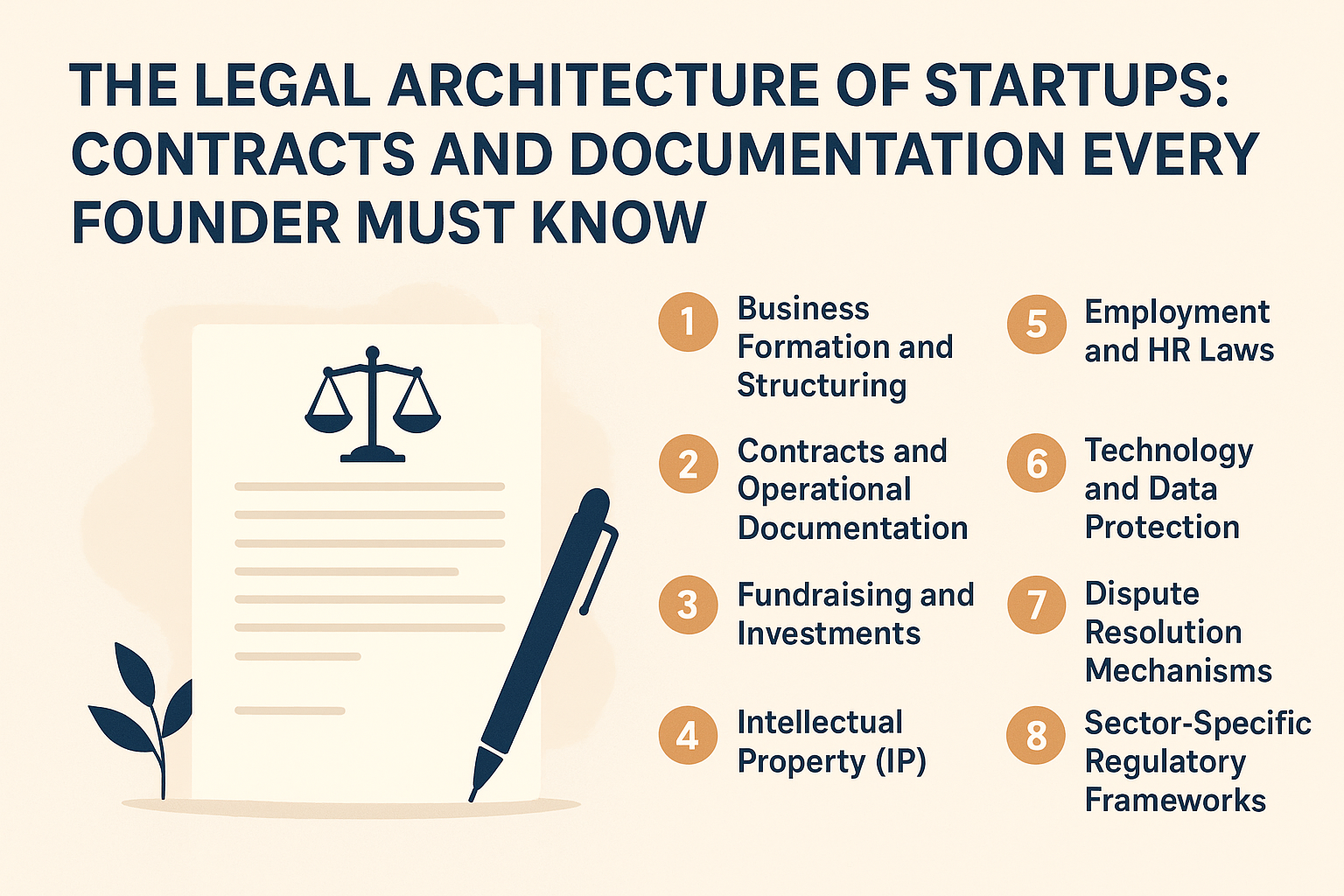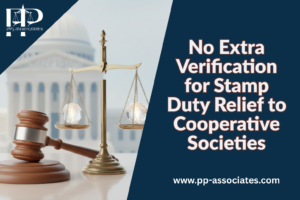In India’s rapidly evolving startup ecosystem, much attention is given to funding rounds, valuations, and scale. Yet, beneath the headlines, it is often the absence of legal structuring and documentation that derails even the most promising ventures. From the very moment of incorporation to the eventual exit, the journey of a startup is intertwined with law. The question is not whether legal frameworks are necessary, but how early and how comprehensively they are put in place.
Drawing from practical patterns in the startup world, one can trace the life-cycle of legal documentation that every founder should be aware of.
1. Business Formation and Structuring
The foundation begins with choosing the right entity. The Companies Act, 2013, the LLP Act, 2008, and the Partnership Act, 1932 provide the frameworks most relevant for new ventures. Founders must decide whether to incorporate as a Private Limited Company, LLP, One Person Company (OPC), or Partnership, each carrying distinct compliance burdens and investor perceptions.
Early-stage ventures often underestimate the importance of Founders’ Agreements and Shareholders’ Agreements. These contracts regulate equity splits, decision-making, vesting schedules, and dispute resolution. Without them, co-founder disputes can destabilise companies at their most fragile stage. Coupled with cap table structuring and the creation of Employee Stock Option Plans (ESOPs), these early documents determine whether the company projects governance readiness or disorder.
2. Contracts and Operational Documentation
As the startup engages with clients, vendors, and employees, contracts become the backbone of operations. Service Agreements, Vendor Agreements, Consultancy Agreements, and Employment Contracts ensure clarity of rights and obligations.
The importance of Non-Disclosure Agreements (NDAs) — both mutual and unilateral — cannot be overstated, particularly when pitching to investors or discussing confidential product information. Similarly, Master Service Agreements (MSAs) with accompanying Statements of Work (SOWs) provide standardised yet flexible frameworks for customer engagements.
Where startups rely on technology or creative input, IP Assignment Agreements for employees and contractors are critical. Without such assignments, ownership of the very product being pitched to investors may legally rest with developers or designers rather than the company. Increasingly, website Terms of Use and Privacy Policies are also essential, given regulatory expectations around digital platforms.
3. Fundraising and Investments
With capital raising comes a new layer of documentation. Venture financing is structured around Term Sheets, Shareholders’ Agreements (SHA), and Share Subscription Agreements (SSA). Instruments such as Compulsorily Convertible Preference Shares (CCPS), Compulsorily Convertible Debentures (CCD), and newer models like SAFE notes determine how early funding converts into equity.
Compliance with SEBI regulations and readiness for due diligence checklists is non-negotiable. In practice, many term sheets falter not on valuation but because founders cannot produce clear records of ownership, contracts, or regulatory filings. The best-prepared startups treat diligence not as an afterthought but as an ongoing state of compliance.
4. Intellectual Property (IP)
The legal identity of a startup is often its intellectual property. Trademarks secure brand names and logos; copyright law protects software, content, and design; and patents safeguard inventions. Beyond registration, licensing agreements and open-source compliance play crucial roles, particularly for technology companies. Startups that neglect to map their use of open-source software often discover belatedly that restrictive licences (e.g., GPL) can compromise their proprietary claims.
5. Employment and HR Laws
Scaling teams requires compliance with employment law frameworks. Offer letters, employment contracts, and contractor agreements must distinguish between employee and non-employee roles to avoid misclassification disputes. ESOP policies demand careful structuring and adherence to company law provisions. Labour laws such as the Payment of Gratuity Act, EPF Act, maternity benefit rules, and POSH compliance extend even to early-stage ventures. In today’s climate, culture and compliance are increasingly linked; investors look closely at whether HR policies are in place.
6. Technology and Data Protection
As digital business expands, compliance obligations multiply. In India, the IT Act, 2000 and the newly enacted Digital Personal Data Protection Act, 2023 set standards for personal data management. Globally, frameworks such as the GDPR (EU) and CCPA (California) may apply to Indian startups serving overseas clients.
Startups must also address cybersecurity protocols and SaaS licensing agreements. For B2B SaaS companies, demonstrating data protection readiness is increasingly a prerequisite for enterprise sales. Data Processing Agreements (DPAs), breach response playbooks, and cross-border data transfer policies are no longer optional.
7. Dispute Resolution Mechanisms
Disputes are inevitable. How they are resolved determines whether they consume months of time and reputation or are swiftly contained. The Arbitration and Conciliation Act, 1996 provides frameworks for binding private dispute resolution. Mediation and negotiation, sometimes coupled with Lok Adalats, offer cost-effective alternatives. For unpaid dues, especially by larger corporates, the MSME Act provides expedited remedies. The inclusion of tiered dispute clauses in founders’ agreements and contracts can pre-empt escalation and preserve relationships.
8. Sector-Specific Regulatory Frameworks
Not all startups face the same set of rules. The regulatory landscape varies dramatically depending on the industry, and understanding this difference is crucial. A fintech venture, for instance, cannot operate without dealing with compliance around payments, customer verification, and financial reporting. Healthtech businesses must consider both medical practice standards and the handling of sensitive patient data, which brings its own privacy and security expectations.
Edtech founders encounter requirements around accreditation, online learning norms, and child protection, while e-commerce ventures are judged by consumer trust — which is why return policies, grievance redressal systems, and data disclosures carry so much weight. In newer spaces such as artificial intelligence, blockchain, or drone technology, the frameworks are still evolving. This creates both risk and opportunity: those who anticipate regulatory expectations early often gain the trust of investors and customers, while those who ignore them risk abrupt disruption when formal rules arrive.
While product and fundraising often dominate a founder’s mind, it is taxation and compliance that quietly determine whether growth is sustainable. Many governments have created special startup recognition schemes that provide tax holidays and simplified compliance, but availing these requires timely applications and ongoing diligence.
At a basic level, businesses must keep up with direct and indirect tax obligations, but globalising startups also need to account for rules around cross-border investments, currency controls, and revenue repatriation. Internally, companies are expected to maintain a rhythm of filings, board approvals, and annual records. Yet, many young ventures lack a compliance calendar, which leads to last-minute firefighting, penalties, or even investor discomfort during due diligence.
Founders who view taxation and compliance not as bureaucratic hurdles but as part of governance infrastructure often discover that this discipline becomes a credibility signal in itself — reassuring investors, attracting partners, and laying a foundation for scale
9. Exit and Scaling
Finally, as startups mature, questions of exit and scale emerge. Mergers and acquisitions, whether through asset sales or share sales, require detailed documentation and regulatory approval. For those winding down, the Insolvency and Bankruptcy Code (IBC), 2016 provides procedures. Cross-border expansion brings its own complexities: compliance with foreign exchange laws, double taxation agreements, and jurisdiction-specific startup laws.
FINAL WORDS: The legal journey of a startup mirrors its business lifecycle: formation → fundraising → operations → compliance → IP → disputes → exit. Each stage requires its own set of contracts and documentation. A founder who neglects these does so at their peril; investors, customers, and regulators will not. The broader lesson is that law is not a cost but an asset. It is governance that reassures investors, contracts that close sales, IP that secures valuations, compliance that opens markets, and dispute frameworks that preserve value. In essence, legal preparedness is not parallel to startup growth — it is at its core.






